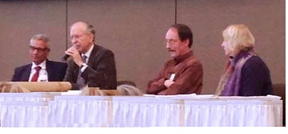
and Elaine Molchanov, MSW
CHICAGO: The C.G. Jung Institute of Chicago sponsored a day-long symposium “West Meets East in Jung’s Psychology: A Dialogue” on March 22 at Loyola University’s downtown campus. This dialogue reflected the memory of Arwind Vasavada, D.Litt., who practiced as a Jungian analyst in Chicago from 1970 to 1998.
Featured speaker, Murray Stein, PhD, delivered the opening address on “Jungian Psychology in Translation.” He spoke with much affection about his relationship with Vasavada, which in some ways paralleled that of Carl Jung with the China scholar Richard Wilhelm. Emphasizing the ego-self relationship that Jung took from India, Dr. Stein related the spread of Jungian psychology into China, Japan, and India and what it might mean for the ability of these cultures to hold on to and develop their own great traditions.
Dr. Vasavada, Ph.D. from Banaras Hindu University finished a diploma thesis at the Zurich Jung Institute in 1957 on the Shakta (tantric) text of the Tripura Rahasya, comparing its doctrine of spiritual insight with Jung’s theory of psychological maturation (individuation). Vasavada’s intellectual and spiritual jousts with Jung were legendary at the Institute and he continued to practice meditation and spiritual disciplines – and to prescribe them to patients – during his years as a psychoanalyst.
Describing his last two-hour meeting with Jung, Vasavada wrote about the “valuable criticism and fiery ordeal which will ever remain as an insignia of my initiation by him.”
These themes – fire, ordeal, and initiation – emerged powerfully in all the presentations, being ignited early in the day through a film from the late sixties of Vasavada being interviewed by a young Murray Stein and Joe Pasic, MD, another Jungian analyst who was in fact present at this symposium.
Psychiatrist and Jungian analyst from Milwaukee, Ashok Bedi, MD, spoke of “Jung’s Encounter with the Soul of India.” Dr. Bedi, who leads groups on psycho-spiritual tours of India, discussed the differences between Indian and Western psychologies and movingly addressed Murray Stein as his “guru,” thus exemplifying his interpretation of Jungian thought through the lens of Indian ideas and India from the Jungian perspective.
Jungian analyst Elaine Molchanov, LCSW, ACSW, a forty-year practitioner of Siddha Yoga, spoke on “Snakes and Ladders: The Play of Consciousness in the Sand.”
She used the trope of the Indian game of “Snakes and Ladders” to present her own mid-life process of “sandplay,” a Jungian technique of exploring the deep personality by placing small miniature objects into a sand tray as a way to dialogue with the unconscious and higher self. Themes of fire, the world-mountain, and initiation emerged.
“Dreams, the I Ching, and the Psychoanalytic Process” was the theme of Dennis Merritt, PhD, LCSW, a case-study in which the Chinese symbols of the I Ching paralleled the dream images of a modern Westerner, guiding him deeper into a process of psychological transformation.
Indian and Chinese thought were important sources of the psychology of Carl Jung, the great Swiss psychologist and early collaborator of Sigmund Freud.
From India, in particular, Jung took the idea of a higher self beyond the usual sense of personal identity known in psychoanalysis as the “ego.” Jung’s method of treatment owed much of its flavor to the Indian institution of the guru-disciple relationship, addressing the spiritual as well as the personal issues of the client.
Alfred Collins, PhD






